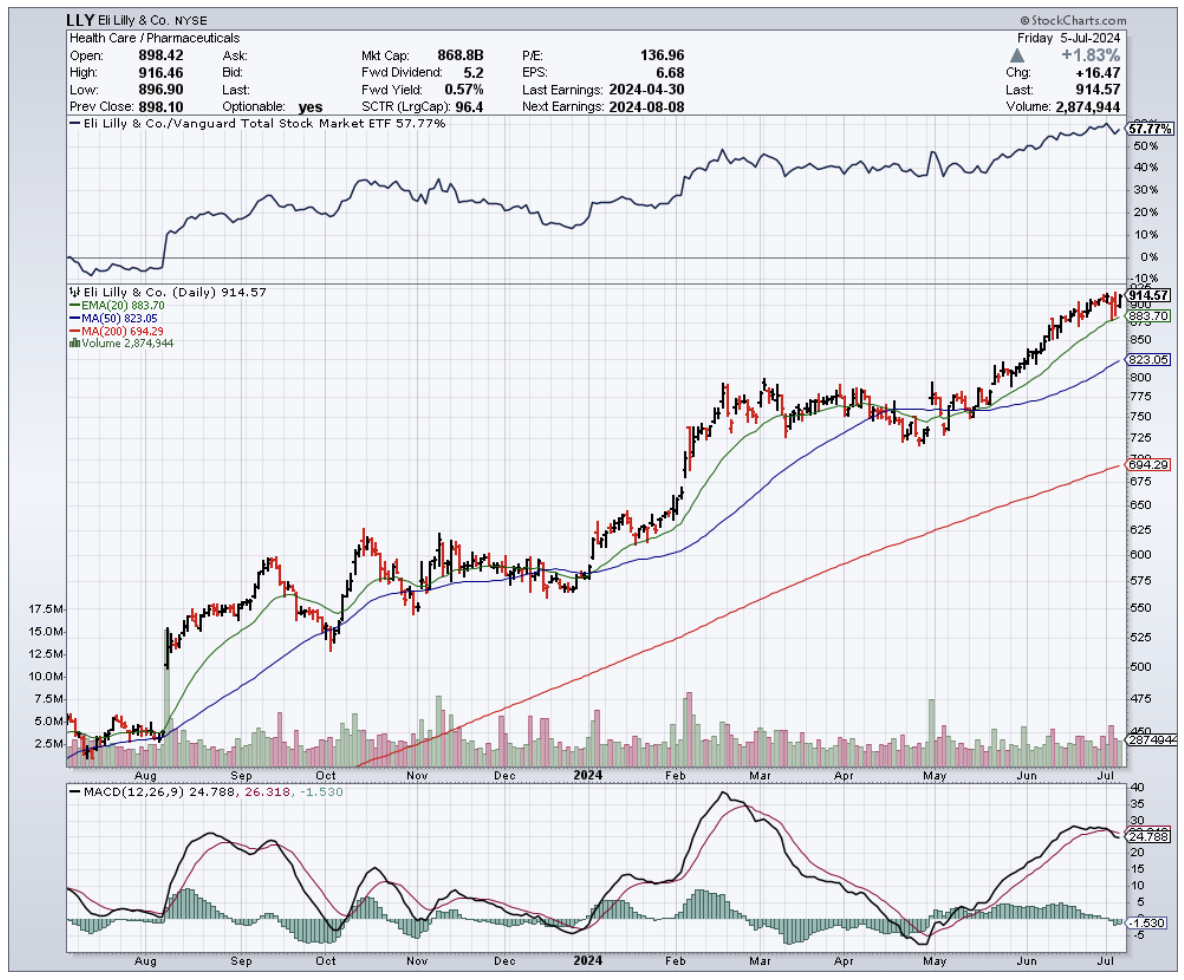Plaque To The Future
It's time we talk about a company that's been hotter than a two-dollar pistol at a Texas gunfight. I'm talking about Eli Lilly (LLY), the pharmaceutical juggernaut that's been turning heads faster than a Wall Street trader spotting a million-dollar bill on the sidewalk.
The last time we chatted about Lilly, we were salivating over their obesity wonder drug, Zepbound. Well, hold onto your hats, because that little pill has catapulted Lilly into the big leagues.
We're talking about an $816 billion market cap. That's not just big - it's “move over Tesla (TSLA), Visa (V), and Walmart (WMT)” big.
Let me throw some numbers at you for better context. Zepbound, which only got the FDA nod in November 2023, already raked in a cool $517 million in Q1.
But that's chump change compared to what's coming - we're looking at projected sales north of $16 billion per year by 2029. That's billion with a “B,” as in “Boy, I wish I'd bought more Lilly stock.”
Still, Lilly isn't content with just one golden goose. Oh no, they've gone and done it again, this time in the Alzheimer's arena.
The FDA gave their new drug, Kisunla, the green light earlier this month, and this one isn’t some. This stuff is like a cognitive Roto-Rooter, clearing out those amyloid plaques that turn your brain into Swiss cheese. We're looking at a potential 35% slowdown in cognitive decline.
Now, as we all know, Lilly isn't the only player in this game.
Biogen's (BIIB) been stumbling around with Leqembi like a drunk at a bar mitzvah, and Lilly's been taking notes. It's called the second-mover advantage, and Lilly's playing it like a pro.
Here's where it gets even more interesting. Lilly's pricing Kisunla at a wallet-busting $32,000 a year. That's not just aggressive, that's “charging-a-bull-with-a-red-cape” aggressive, especially when Biogen's asking a mere $26,500 for Leqembi. That's chutzpah, my friends, but it's the kind of gamble that could pay off big time.
Speaking of paying, let's talk numbers. Lilly's Q1 earnings were impressive, with revenue up 26% year-over-year to $8.77 billion. Net income? A cool $2.24 billion. And they're so confident, they've jacked up their full-year guidance by $2 billion.
That’s not where the good news ends, though. After all, Lilly has proven time and again that it’s not just a one-trick pony. If anything, this biotech and healthcare giant has a stable of thoroughbreds bringing in the big bucks.
There’s Mounjaro for diabetes, which is their star player, raking in $1.81 billion in Q1 alone. And let's not forget about Verzenio for breast cancer, Jardiance for diabetes and heart failure, and Taltz for psoriasis. It's like they've got a drug for everything but mediocrity.
Now, I know what you're thinking. "But John, what about the dividends?" Well, Lilly's just boosted them by 15% for 2024. Sure, the yield looks as thin as a supermodel's waistline at 0.6%, but that's only because the stock price has been on a rocket ride to the moon.
We're talking about a 717% increase in five years. That's not a bull run – that's a full-on bull stampede.
So, what's the best way to play this? Well, if you're looking for a short-term bet, I'd be as nervous as a long-tailed cat in a room full of rocking chairs. This stock's priced for perfection, and Wall Street can be fickle.
But for the medium to long haul? Lilly's looking sweeter than grandma's apple pie. They've got the products, they've got the pipeline, and they've got more momentum than a freight train going downhill.
In the world of biotech and pharma, Lilly's not just playing the game - they're changing it. And in my humble opinion, that makes them a Buy with a capital B.

